Why Vote In an Uncontested Election?
- Details
- Hits: 7891
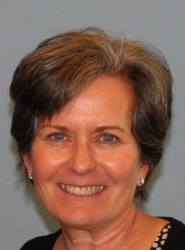 Tuesday, March 15 is Election Day in Scarsdale for the village mayor and for three village trustees. This year, as has been the case for the overwhelming majority of the last 100 years, the election is uncontested. Four candidates are running for four positions. For full disclosure, I am one of those candidates and have been nominated to serve as a village trustee. I hope that, if you are a registered voter in Scarsdale, you will vote on March 15. Your vote is important even in an uncontested race.
Tuesday, March 15 is Election Day in Scarsdale for the village mayor and for three village trustees. This year, as has been the case for the overwhelming majority of the last 100 years, the election is uncontested. Four candidates are running for four positions. For full disclosure, I am one of those candidates and have been nominated to serve as a village trustee. I hope that, if you are a registered voter in Scarsdale, you will vote on March 15. Your vote is important even in an uncontested race.
Hundreds of Scarsdale residents volunteer tens of thousands of hours annually in wide-ranging activities that enhance life in our community. People who volunteer do so because they believe that their efforts make a difference. All of us know that the combined effort of so many people contributes in wonderful ways to the quality of life in our village. Men and women who serve on the village and school boards, and as mayor, are also volunteers.
Each year, the Citizens’ Nominating Committee proposes candidates for village trustee vacancies, and every two years the CNC nominates a mayoral candidate. The School Board Nominating Committee serves the same function for school board candidates. Any registered voter may run to serve as a member of one of the nominating committees and any eligible adult may appear before the nominating committees to be considered in the candidate selection process.
This non-partisan nominating process was inaugurated in Scarsdale in 1911 in order to minimize the discord that can arise in a contested electoral process.
Is the process perfect? No, but non-partisan elections have many characteristics that serve to strengthen our community. First, the nominating committees typically reach out to prospective candidates with vastly different sets of experiences and skills. The non-partisan process successfully attracts many qualified people who have expertise and civic commitment but who would not be interested in the competitive nature of a contested election, including the fundraising and sparring that comes with running against an opponent.
Candidates who are nominated through the non-partisan process are not defined by party affiliation, and they owe no allegiance to any organization, donor, or group, other than to the residents of Scarsdale. The boards are accountable only to the community.
Because non-partisan candidates have not campaigned on a platform of issues and promises, when elected, they are able to enter the debate about matters that affect the community neutrally and with an open mind. Equally, residents can feel comfortable that their representatives serve everyone. There will still be issues that are controversial. There will still be decisions that do not satisfy all people. But by means of the non-partisan process, controversy does not have to translate into divisiveness.
Your vote for in village and school board elections reflects your commitment to Scarsdale and your commitment to the volunteerism that is the hallmark of our village. Please support the non-partisan election process by casting your vote in the village election on March 15. Voting will take place at Village Hall from six to nine in the morning, and from noon until nine in the evening.
See a video of the four candidates here:
Accident at Seely Place and more from the Greenburgh Police
- Details
- Hits: 6527
 A tractor trailer backed into a building on the property of the Seely Place school at 9:45 am on Thursday March 3rd. A school custodian called police when the Yellow Freight Company truck hit one of the pillars on the front of the building while attempting to make a delivery.
A tractor trailer backed into a building on the property of the Seely Place school at 9:45 am on Thursday March 3rd. A school custodian called police when the Yellow Freight Company truck hit one of the pillars on the front of the building while attempting to make a delivery.
Both the Greenburgh Police Department and the Greenville Fire Department responded and fortunately there were no injuries to any bystanders or the driver. The school day was not interrupted and students and teachers were never endangered. The Town of Greenburgh Building Department will conduct a follow-up investigation to assess the extent of structural damage to the building.
Facebook Threat: A Hartsdale woman reported a threatening message she received from a high school acquaintance from Pelham on Facebook on February 22. The message said “Carol, you will be missed”… and that “the world is full of watchers, talkers and sleepers …” Police tried to make contact with the Pelham woman but her Facebook account was locked.
The owner of Bird Jungle on Central Avenue called police on the evening of 2/22 when an irate customer was screaming obscenities at him. The customer, Michelle C Misch of Yonkers was angry about a purchase she made in the past. She threatened to sue the store but left before police arrived.
Inside Job at the Christmas Tree Shop: The Loss Prevention Officer at the Christmas Tree Shop on Central Avenue reported that he was contacted by the store’s corporate office who told them that an employee of the store was committing fraud using store coupons. The Loss Prevention Officer confronted the cashier and she admitted to taking $149.43. On 2/23 the employee was arrested, transported to headquarters and released pending a court date.
A 28 year-old man was reported missing from a group home on Old Army Road home on Sunday 2/27. He called his mother and said he was going to visit a friend and that he would not return to the home. He has a history of mental disorders and requires medication.
A Highpoint Road woman contacted the police on 2/28 concerning her 2010 tax return. She found out that someone had filed electronically in her name on 1/15 and 16/2011. Consequently when she tried to file her actual return, the IRS rejected it.
Teachers, Ethics, A Bargain, and Scarsdale
- Details
- Hits: 6402
 Over the past several years, I’ve reflected a fair bit on my life. Thinking about times past is not a new thing for me – for decades I have happily recalled particular plays from high school football or baseball games, for example – but for one reason or another my thoughts of late have turned increasingly introspective. And when I think about the biggest influences on my life, coaches and teachers always come to the fore.
Over the past several years, I’ve reflected a fair bit on my life. Thinking about times past is not a new thing for me – for decades I have happily recalled particular plays from high school football or baseball games, for example – but for one reason or another my thoughts of late have turned increasingly introspective. And when I think about the biggest influences on my life, coaches and teachers always come to the fore.
My parents, dead ringers for Frank and Estelle Costanza of “Seinfeld” fame, had something to do with this. Whilst they argued over whether the Dead Sea or the Red Sea was the best sea, I fought to tune them out. On the rare occasion I turned to them for help or guidance, they mostly came up empty.
What I have lately come to realize is that much would have turned out poorly for me except for one saving grace in my life – Polytechnic School (Pasadena, CA). Well known to college admissions officers throughout the country, Poly is one of the finest private schools in the country. It was at Poly that I found adults that I could learn from, adults who I could appreciate, and consequently, adults that I would listen to. Poly made all the difference.
We’ve got seven public schools in Scarsdale, and our district is a beacon of what a public education can and should be. Of course it has flaws (as did my beloved Poly), but in the end we have a special district run by excellent administrators and superb teachers. Any organization with 400 employees has a bottom ten percent, of course, but we really do have a remarkable set of teachers. And for many of our students, these teachers (as mine did for me) make a real, noticeable impact on their lives – an impact that will be felt for decades.
If I have learned anything in my life, it is that great teachers are worth almost any reasonable, market-based price. Great teachers are a scarce commodity – the trick is finding them and hiring them and keeping them.
Many of us in the private sector have seen our pay cut, or our pensions taken away or our medical benefits diminished. Or perhaps all three. And some of us have lost our jobs outright. But unlike some in this town, I’m not looking to get my pound of flesh to even the score. In fact, I see the growing regional hostility toward teacher pay as a potential competitive advantage. If others look to violently clamp down and Scarsdale remains reasonable, we can more easily hire the best and the brightest.
When you decide to make teaching your life’s work, you are voluntarily choosing to put a cap on your lifetime earnings. One can calculate this cap with a fair amount of precision. If I work Y years, and get a Master’s degree, once I have been working 30 years I will make $X. Though the earnings cap is real, teachers get excellent benefits and generous vacation, and tenure. This is the essential bargain that they have signed up for.
Now, many want to change the bargain. Leaving tenure aside (I am not a fan), suppose someone began teaching at age 24 and is now 45 years old. They went into the profession having struck the bargain above. Now, midstream, many want to change the bargain. It isn’t ethical.
Unlike teaching, there is no cap on what an individual can earn in the private sector. For a captain of industry or an internet innovator, financial reward is theoretically unlimited. Teachers knowingly accept this reality when they choose the profession. But they also “know” that the benefits are excellent and so, again, they strike the bargain.
So, what to do? I’d suggest a few things. Regarding pension, the state should create a two tiered system. One for new teachers and one for those already in the system. New teachers would not even have a traditional pension, but they’d know this coming in, and can choose a different profession if this is a deal breaker. But those already in the system should continue to have the pension they signed up for. It simply isn’t right to change the bargain midstream.
Locally, I’d continue to pay top dollar for top talent. Great teachers and coaches made my life what it is today. Without Geoff Yure (Football) and Roger Ipswitch (Social Studies), I’m nothing. And that’s worth……..everything.
 Jeff Blatt served on the Scarsdale Board of Education and lives in Greenacres with his wife Erin and daughters Charlotte, Josephine and Louisa. Mr. Blatt graduated cum laude from Dartmouth College in 1987 and served as Publisher of the daily campus newspaper, The Dartmouth and is currently on the newspaper’s Board of Directors. He earned his MBA beta gamma sigma via Columbia University's Executive Program in 1996.
Jeff Blatt served on the Scarsdale Board of Education and lives in Greenacres with his wife Erin and daughters Charlotte, Josephine and Louisa. Mr. Blatt graduated cum laude from Dartmouth College in 1987 and served as Publisher of the daily campus newspaper, The Dartmouth and is currently on the newspaper’s Board of Directors. He earned his MBA beta gamma sigma via Columbia University's Executive Program in 1996.
In his professional career, he is CEO of Synapse Group, Inc. and QSP, Inc., both wholly owned subsidiaries of Time Incorporated. Synapse is a marketing solutions provider, lead generation company, and the largest third party marketer of magazine subscriptions in the United States. Prior to assuming his current posts, Mr. Blatt served as President of Time Direct Ventures (TDV), a division of Time Consumer Marketing that develops new channels of subscription sales for Time Inc. where he has worked in a variety of posts for 23 years.
Explore the Roots of the Middle East Uprisings at the Scarsdale Adult School
- Details
- Hits: 3935
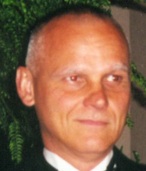 The explosive news from the Middle East makes Professor Ron Brown’s course on Religion and the New World Order especially relevant today. Dr. Brown’s will be teaching at the Scarsdale Adult School for four Thursday’s, beginning on March 3rd and will focus on many of the issues that have driven recent uprisings in Tunisia, Egypt, Bahrain, and Libya and clashes in cities around the world.
The explosive news from the Middle East makes Professor Ron Brown’s course on Religion and the New World Order especially relevant today. Dr. Brown’s will be teaching at the Scarsdale Adult School for four Thursday’s, beginning on March 3rd and will focus on many of the issues that have driven recent uprisings in Tunisia, Egypt, Bahrain, and Libya and clashes in cities around the world.
Topics for the sessions will include:
Religion in the News Today: Brown will explore religious inspired terrorism and wars in the Middle East, campaigns to outlaw abortion, oppose gay marriage, and return prayer to the schools in the United States, the Israeli ethnic cleansing of Jerusalem and settlement building in the West Bank and campaigns by African Christians and Muslims to divide religiously mixed into one-religion states.
Samuel P. Huntington’s Vision of the Religious Future of the World: In his book The Clash of Civilizations and the Remaking of World Order Huntington argues that the future will be dominated by religious conflict between the nine major world religions. Regarding the United States, Huntington warns that the country must halt the inflow of new immigrants who do not share our historic religions and have no intent to assimilate. He argues that if we fail to close the gates the country will become a battlefield in the “Clash of Civilizations.”
The Religions of Today are not those of the past: Mass international migration has transformed local faiths such as Pentecostalism, Mormonism, Voodoo, Santeria, Islam, Buddhism, Sikhism, Jainism, and Hinduism into global faith communities. In addition, the bulk of these migrants settle in mega-cities where they are often greeted with hostility. In response to these upheavals many migrants reinterpret their religions in ways their elders and religious leaders would never recognize.
Flushing, Queens as a Paradigm for the Future: Founded by the Dutch in 1644 as a refuge for exiled English Quakers, Baptists, and other non-conformists, the town of Flushing was proud of its religious diversity. But in 1657 Dutch Governor Peter Stuyvesant attempted to restrict their religious freedom of the town. They responded by sending the Flushing Remonstrance to Holland, which demanded religious freedom for not only all Christians, but Jews, and Muslims as well. The Dutch authorities instructed the governor to grant religious freedom to the town and soon Flushing became a beacon of religious freedom and tolerance. Can Flushing show the world the way to avoid Huntington’s “Clash of Civilizations”?
Dr. Brown holds degrees from Gannon University, The Hebrew University of Jerusalem, Harvard University, and the University of Geneva, Switzerland in history, world religions, and international relations. He currently teaches at Touro College and the Unification Theological Seminary in New York City, and has taught at universities in Jerusalem, Moscow, Budapest, and Prague. He recently appeared on the PBS special program, “God in New York City.
The class will be held four Thursdays, starting 3/3 from 7 - 9 pm at Scarsdale High School and the cost is $115.
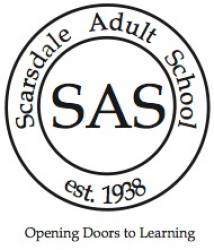 To register, for information on all SAS offerings, and to view the full catalog, visit www.ScarsdaleAdultSchool.org . Look for your new spring catalog in the mail or at Village Hall and the Scarsdale Public Library. Questions? Call 723- 2325.
To register, for information on all SAS offerings, and to view the full catalog, visit www.ScarsdaleAdultSchool.org . Look for your new spring catalog in the mail or at Village Hall and the Scarsdale Public Library. Questions? Call 723- 2325.
Scarsdale Forum Calls For Reduction in School Budget Growth
- Details
- Hits: 19753
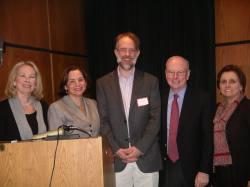 At their February 3rd meeting, the Scarsdale Forum focused on education and heard presentations from the School Administration and School Board President Jill Spieler, and considered two reports produced by the Educational Fiscal Committee on Teacher Compensation.
At their February 3rd meeting, the Scarsdale Forum focused on education and heard presentations from the School Administration and School Board President Jill Spieler, and considered two reports produced by the Educational Fiscal Committee on Teacher Compensation.
The meeting opened with a presentation from school administrators providing the rationale behind the Scarsdale educational program and an explanation of the drivers of the school budget. As the School Administrators and Board were well aware that the Forum had issued a report that cited Scarsdale’s high staff salaries, the Superintendant, Assistant Superintendants and School Board President sought to educate the group about the excellent education financed by community tax dollars.
Lynn Shain, Assistant Superintendant for Instruction gave a presentation called “The Building Blocks of a Scarsdale Education” which connected the elementary school program with the outstanding achievements of high school students in Scarsdale. She explained how the district’s literacy program, Singapore math program, and “inquiry” approach” to social studies and science, teach critical thinking skills that are essential to success in higher education.
Board President Jill Spieler reviewed some new and innovative programs that have been adopted by Scarsdale teachers, contending that our contract with staff “does not impeded innovation.” In the past few years, the district has moved to Singapore Math, introduced new eighth grade assessments and completed the transition from the AP program to AT. In addition, the district has “embraced the use of digital tools, to making learning relevant.” World language instruction has been extended to sixth graders and an after-school program in Mandarin has been added.
Furthermore, she said, “over the last year the community has supported the current program.” She warned that, “We can’t continue to cut the number of teachers without increasing class size or cutting programs.”
Yielding his time to others, School Superintendant provided a philosophical note on the current budget woes, saying, “Given the unusual heat we should recall that the object is an enlightened outcome.”
Linda Purvis Assistant Superintendant for Business took the stage to review the drivers behind the school budget. In an explanation of budget growth she listed the following factors:
- Since 2001, district enrollment has grown from 4300 students to 4800 students
- Mandated costs for pensions and health benefits are the fastest rising costs in the budget
- In 2000, the community authorized $100 million in construction costs, and the debt service from those projects increased the annual school budgets
- The addition of a fourth house in the Middle School and the reduction of elementary school class sizes necessitated the hiring of additional teachers and staff
- In response to the community, the district expanded extracurricular activities to allow wider student participation.
In the past three years, school budget growth has been modest with a 2.91% increase in 2008-9, 1.95% increase in 2009-10 and 2.87% increase in 2010-11.
A proposed 2% tax cap that has been passed by the State Senate is now before the State Assembly. If enacted, it would be imposed for the 2012-13 school year and require Scarsdale to cut approximately $6 million from the school budget. Likely targets of cuts would be educational programs and athletics, and increases in class size may result.
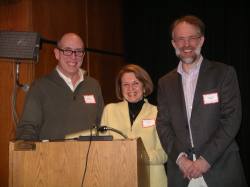
Bensche opened by telling the group that the committee had a “real barn burner of a time discussing two volatile issues; your kids and your money.” He then said, “Talking about teachers’ compensation is a losing proposition – and I have lost hair, lost weight and lost my temper.
Telling the group that the committee made many compromises so that they could get the broadest possible support, he contended that the compounded school budget growth rate is too high. In their 26-page report, the committee found that the average compensation for Scarsdale’s 606 school employees was $122,995 with benefits of $45,350 for an average of $168,345 in salary and compensation per employee. In comparison to Chappaqua, Scarsdale pays teachers a premium of 10-15% and they also found that in 2008-9 Scarsdale’s median salary was the highest in the state.
He explained that the committee was not in favor of cutting current salaries but addressing the future growth rate. The committee recommended that:
- The Board reduce the rate of growth of total compensation by reconsidering STEP and Cost of Living increases.
- The district lobby for pension reform and mandate relief.
- The district require employees to pay a larger percentage of their healthcare costs
He concluded, by saying, “Something’s gonna have to give or I am going to run out of money.” Though he was jocular, Bensche knew his audience who rewarded his performance with a warm round of applause.
Former teacher Mary Beth Evans presented the minority report written by Evans, Nan Berke who is the President of the SHS PTA, attorney Arthur Rublin and Eric Staffin who is the treasurer of the TVCC and former President of the Eastchester Foundation.
They concurred that “today’s conditions call for conservative growth,” but the minority report disagreed with the majorities “top-down, constricted approach to educational budgeting, which sets a target for budget growth tied to the rate of inflation plus enrollment growth. “ They argued that, “This approach fails to account for either the general reality of education or the current reality of rising health care and state mandated costs that are beyond our local control. Given such realities we cannot aim for such an unrealistic target and continue to ensure the same high quality of public education in Scarsdale.”
They also disagreed with a reduction in “the rate of teacher compensation growth in order to reach for a budget growth target tied to inflation plus change in student enrollment.” In their view, this would “slow the rate of teacher salary growth to below that of neighboring districts.”
Evans continued with, “Given the projected combined costs of market-driven health care and retirement contributions, which alone are expected to total about 2.5 % in “real” budget growth for the coming year, it is difficult to imagine how we might productively or prudently aim for teacher compensation growth tied to inflation.”
The floor was opened for comments and several people spoke to favor of the majority report. When votes were counted, The Forum adopted the majority report by a vote of 60 to 17.
With pressure from the community to curb tax increases and rising costs from the state, the School Board and Administration face another tough year of crafting a budget that will receive voter approval in May.
Pictured at top: Lynn Shain, Jill Spieler, Bruce Wells, Michael McGill, Linda Purvis













